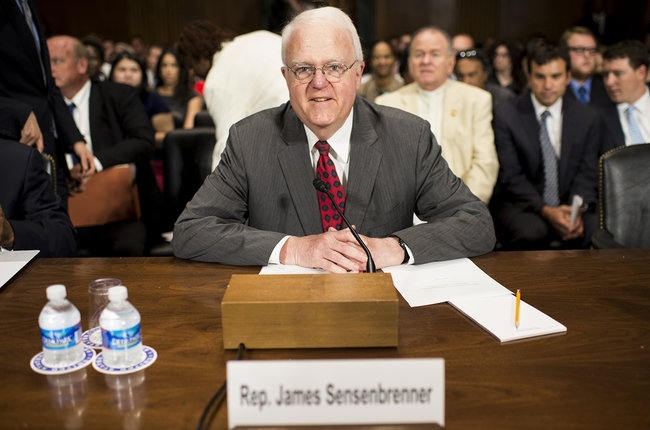On the surface, at least, the “Transparency in Music Licensing Ownership Act,” introduced in the House of Representatives on July 20 by Congressman Jim Sensenbrenner (R-WI), seems like a copyright bill that could help untangle the online music business. At a time when accurately identifying rightsholders has become an important issue -- and an expensive one -- the bill would direct the U.S. Copyright Office to create a database to make the process easy. Who could be against transparency? Or an easy way to identify rightsholders? Or, in a business where information is hoarded for strategic advantage, a comprehensive database run by a neutral organization?
Well, the devil is in the details. Along with a database, the bill would establish rules that could take away the leverage rightsholders use to make sure they get paid.
That leverage comes in the form of the statutory damages set by copyright law, which can range from $750 to $150,000 per work, in cases that involve willful infringement. This gives songwriters and publishers the legal equivalent of heavy artillery to make sure streaming music services pay them mechanical royalties -- especially in potential class-action cases. Spotify settled one such suit in May, although it was recently hit with two more. Other streaming services could face similar litigation.
Online music services see that level of liability as ruinous and they have a point. But federal litigation can cost more than $250,000 and there’s no small-claims court for copyright infringement. Usually, it’s the artillery or nothing. And the “Transparency in Music Licensing Ownership Act” takes that weapon away. Under the bill, copyright owners that fail to “provide or maintain the information” in the database would no longer be able to qualify for statutory damages. Instead, they’d have to prove actual damages.
This, too, might seem reasonable -- at first. But look at what kind of information the bill would require. Some of it’s what you’d expect: Title, date of copyright registration, ownership. But rights-holders would also have to provide “each album title containing the work or recording.” That means that anyone who owns a song has to provide the title of every album it appears on -- even when it’s performed by other artists. Since anyone can record another writer’s song, as long as they pay royalties, that’s hard to keep track of. What about unlicensed recordings? For that matter, how often does this information need to be updated?
It gets worse. The bill also calls for the database to include “Each catalog number and each label name used on phonorecords [recordings] of the work made and distributed to the public.” How hard could this be? Well, let’s say you own the composition “Stairway to Heaven,” made famous by Led Zeppelin. The album it originally appeared on -- is that called Led Zeppelin IV or Zoso? -- was manufactured under more than a dozen different catalog numbers in the U.S. along, according to Discogs.com. The original version of the song also appeared on a few different box sets and compilations. The band also released four live versions. And that’s not even counting covers, recorded by artists from Rodrigo y Gabriela to Mary J. Blige (not her finest moment), as well as high-concept acts like the Vitamin String Quartet and the Lullaby Players (not theirs either, and the bar is a lot lower).
Could the bill really require this level of information from copyright holders? Several lawyers for rightsholders said it was hard to tell, while others wondered if the reference to “catalog number” was intended to refer to an International Standard Recording Code (ISRC), although that’s mentioned separately. (The Sensenbrenner staffer who worked on the bill couldn’t be reached by time of publishing.) And would the database have to include unlicensed performances of compositions? It doesn’t say. This could all be changed, of course, as the bill is considered.
The stakes are high, though. Rightsholders that don’t maintain sufficiently accurate records -- the bill doesn’t define a standard -- would lose their legal leverage. In some cases, they would have no way to sue infringers without losing money -- even if they won in court. They would go from wielding artillery to brandishing pea shooters.
Already, the bill has united a wide coalition of music licensees, from online streaming services to radio stations and restaurants -- which wield outsized power because every Congressional district has some. Spotify’s general counsel, Horacio Gutierrez, said on Twitter that it’s a “common-sense solution to a systemic problem in the music industry.”
The music business certainly needs a comprehensive, centralized database and industry players have been frustratingly slow to cooperate on one. (Perhaps this bill will provide the threat that motivates them.) But this bill, at least in its current form, isn’t even really about having the Copyright Office establish a database -- and it doesn’t even mandate that licensees use it. Rather, it’s a bill that uses the lack of a database as a weapon to take away rightsholders’ leverage, in a way that could make infringement just another cost of doing business. And there’s nothing transparent about that at all.








